【BBC六分钟英语】动物应该在动物园饲养吗?
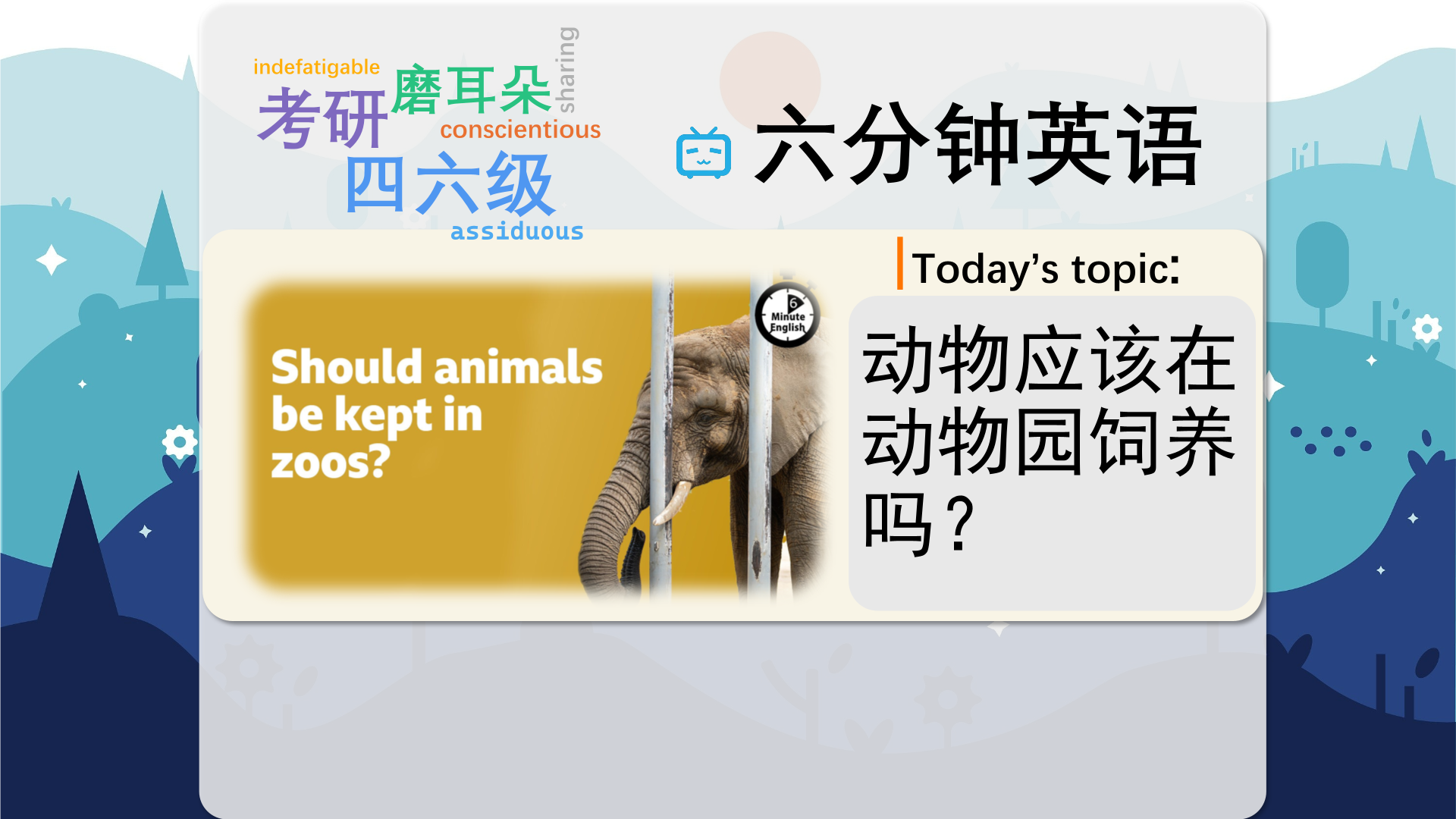
【英文脚本】
Neil
Hello. This is 6 Minute English from BBC Learning English. I’m Neil.
Georgie
And I’m Georgie. In this programme we’re discussing a controversial topic that often produces strong feelings: should animals be kept in zoos? What’s your opinion on this debate, Neil?
Neil
Oh, it’s a really difficult question, Georgie. I think there are good scientific reasons for having animals in zoos, but also, it seems to me a little bit sad and cruel for wild animals to be locked up.
Georgie
For some, zoos are a good way to teach people about nature and save endangered species from extinction. Others think separating animals from their natural habitat is cruel and unnecessary. Either way, with an estimated 700 million visitors every year, zoos remain popular, but are they a good thing? We’ll be debating the pros and cons, as well as learning some useful new words and phrases.
Neil
And remember you can find all the vocabulary for this programme on our website, bbclearningenglish.com. Now, I have a question for you, Georgie. In 2022, five animals escaped from Sydney’s Taronga Zoo in Australia, but were the escaped animals: a) elephants, b) lions, or c) zebras?
Georgie
Hmm. I can imagine zebras running away from the zoo.
Neil
OK. We’ll find out the answer at the end of the programme. Reporter William Lee Adams has been investigating the arguments for and against keeping animals in zoos with BBC World Service programme, What in the World. Here he gives two arguments in favour of zoos:
William Lee Adams
Education is the primary reason that zoos give for why they should exist. The fact is school children all over the world are often bussed to zoos. I remember myself going to see lowland gorillas at Zoo Atlanta every single year, and the point of this was to introduce us to conservation.
Georgie
One argument for keeping animals in zoos is to educate people about the importance of conservation: the protection of plants, animals and the natural world from human damage.
William Lee Adams
A second point is that zoos often invest in research programmes that help endangered animals. Now as we know, pandas are notoriously reluctant to mate: the female pandas have a narrow window of fertility, they’re solitary creatures and it takes two to tango when it comes to reproduction. But a lot of money in zoos – it goes to, sort of, find ways to encourage these animals to mate.
Neil
A second argument is that zoos protect endangered species from extinction through breeding. William mentions pandas, animals which are reluctant, meaning slow and unwilling, to reproduce. Male and female pandas need a little help to make babies, and zoos can provide this help. William uses the idiom, it takes two to tango, to describe an activity which needs two people, or in this case two pandas, to be willing to make something a success.
Georgie
Now, let’s turn to some of the arguments against zoos with Nikita Dhawan, a 19- year-old animal-rights activist from India, who spoke to BBC World Service programme, What in the World:
Nikita Dhawan
I don’t think zoos should exist for several reasons, the first one being zoos’ detrimental impact on both the physical and psychological health of animals. Many studies and research have shown that many animals in zoos and aquariums display abnormal behaviours like head-bobbing, pacing, stereotypical behaviours, signs of mental distress. The second reason, I would say, is that zoos cannot mimic the natural habitat of animals in the wild.
Neil
Nikita argues that being enclosed in a zoo is so stressful for wild animals it leads to abnormal behaviour: behaviour that is different, and worse, from what would normally be expected. Examples of this include animals pacing their cages in circles and rocking, bar-biting, and even self-harm. And they’re so common in captive animals, there’s a name for it: zoochosis.
Georgie
Even zoos with large enclosures cannot fully mimic, or copy, the natural habitats and open spaces these animals would enjoy in the wild. And imagine how a polar bear, evolved for life in the frozen Arctic, would feel, trapped in a zoo in a much warmer country.
Neil
Some zoologists have compared zoochosis to human traumas like post-traumatic stress disorder but say it’s even more damaging. For captive animals, everything – including the air they breathe, is traumatic.
Georgie
We’ve heard a few arguments for and against keeping animals in zoos. What do you think, Neil? Have you changed your opinion at all?
Neil
Well, I think there are really strong arguments on both sides, so I’m still not sure, Georgie.
Georgie
Well, we know how some of the animals at the Sydney Zoo felt about things because they managed to escape! But what was the answer to your question, Neil?
Neil
Well, Georgie, I asked you which animals escaped from a zoo in Sydney, Australia, in 2022. Was it a) elephants, b) lions, or c) zebras?
Georgie
And I said zebras.
Neil
I’m afraid that was the wrong answer. It was actually lions, how scary! OK. It’s time to recap the vocabulary we’ve learned. Conservation is the protection of plants, animals and the natural world from human harm.
Georgie
If you are reluctant to do something, you don’t want to do it, or you do it very slowly.
Neil
The idiom, it takes two to tango, refers to an activity which needs two people to willingly and actively take part for it to succeed.
Georgie
The adjective, abnormal, means different from what would normally be expected, in a bad way.
Neil
Zoochosis is a term to describe the repeated, purposeless behaviour performed by captive animals in response to the stress of being confined, including pacing, head- bobbing and swaying.
Georgie
And finally, if you mimic somebody or something, you imitate it or copy it. Once again, our six minutes are up, but don’t forget we have a worksheet and a quiz that you can use to practise the vocabulary from this episode. Visit bbclearningenglish.com. Goodbye for now.
Neil
Goodbye.
【中英文双语脚本】
Neil(尼尔)
I’m Neil.
你好。这是来自 BBC Learning English 的六分钟英语。我是 Neil。
Georgie(乔治)
And I’m Georgie. In this programme we’re discussing a controversial topic that often produces strong feelings: should animals be kept in zoos? What’s your opinion on this debate, Neil?
我是 Georgie。在这个节目中,我们讨论了一个经常产生强烈情绪的有争议的话题:动物应该被饲养在动物园里吗?尼尔,你对这场辩论有什么看法?
Neil(尼尔)
Oh, it’s a really difficult question, Georgie. I think there are good scientific reasons for having animals in zoos, but also, it seems to me a little bit sad and cruel for wild animals to be locked up.
哦,这真是个难题,Georgie。我认为在动物园饲养动物有充分的科学理由,但在我看来,将野生动物关起来有点可悲和残忍。
Georgie(乔治)
For some, zoos are a good way to teach people about nature and save endangered species from extinction. Others think separating animals from their natural habitat is cruel and unnecessary. Either way, with an estimated 700 million visitors every year, zoos remain popular, but are they a good thing? We’ll be debating the pros and cons, as well as learning some useful new words and phrases.
对于一些人来说,动物园是向人们传授自然知识和拯救濒危物种免于灭绝的好方法。其他人则认为将动物与自然栖息地分开是残忍且不必要的。无论哪种方式,估计每年有 7 亿游客参观的动物园仍然很受欢迎,但它们是一件好事吗?我们将讨论利弊,并学习一些有用的新单词和短语。
Neil(尼尔)
And remember you can find all the vocabulary for this programme on our website, bbclearningenglish.com. Now, I have a question for you, Georgie. In 2022, five animals escaped from Sydney’s Taronga Zoo in Australia, but were the escaped animals: a) elephants, b) lions, or c) zebras?
请记住,您可以在我们的网站 bbclearningenglish.com 上找到该程序的所有词汇。现在,我有一个问题要问你,Georgie。2022 年,澳大利亚悉尼塔龙加动物园有 5 只动物逃跑,但逃跑的动物是:a) 大象,b) 狮子,还是 c) 斑马?
Georgie(乔治)
Hmm. I can imagine zebras running away from the zoo.
嗯。我可以想象斑马从动物园里跑出来。
Neil(尼尔)
OK. We’ll find out the answer at the end of the programme. Reporter William Lee Adams has been investigating the arguments for and against keeping animals in zoos with BBC World Service programme, What in the World. Here he gives two arguments in favour of zoos:
还行。我们将在节目结束时找到答案。记者威廉·李·亚当斯 (William Lee Adams) 一直在调查支持和反对在动物园饲养动物的论点,该节目为 What in the World。在这里,他给出了两个支持动物园的论点:
William Lee Adams(威廉·李·亚当斯)
Education is the primary reason that zoos give for why they should exist. The fact is school children all over the world are often bussed to zoos. I remember myself going to see lowland gorillas at Zoo Atlanta every single year, and the point of this was to introduce us to conservation.
教育是动物园解释它们应该存在的主要原因。事实上,世界各地的学童经常乘坐公共汽车去动物园。我记得自己每年都会去亚特兰大动物园看低地大猩猩,这样做的目的是向我们介绍保护。
Georgie(乔治)
One argument for keeping animals in zoos is to educate people about the importance of conservation: the protection of plants, animals and the natural world from human damage.
在动物园饲养动物的一个理由是教育人们了解保护的重要性:保护植物、动物和自然世界免受人类破坏。
William Lee Adams(威廉·李·亚当斯)
A second point is that zoos often invest in research programmes that help endangered animals. Now as we know, pandas are notoriously reluctant to mate: the female pandas have a narrow window of fertility, they’re solitary creatures and it takes two to tango when it comes to reproduction. But a lot of money in zoos – it goes to, sort of, find ways to encourage these animals to mate.
第二点是动物园经常投资于帮助濒危动物的研究项目。现在我们知道,熊猫是出了名的不愿意交配:雌性熊猫的生育窗口很窄,它们是独居生物,在繁殖方面需要两个人跳探戈。但是动物园里的很多钱 —— 在某种程度上,它都用于寻找鼓励这些动物交配的方法。
Neil(尼尔)
A second argument is that zoos protect endangered species from extinction through breeding. William mentions pandas, animals which are reluctant, meaning slow and unwilling, to reproduce. Male and female pandas need a little help to make babies, and zoos can provide this help. William uses the idiom, it takes two to tango, to describe an activity which needs two people, or in this case two pandas, to be willing to make something a success.
第二个论点是,动物园通过繁殖保护濒危物种免于灭绝。威廉提到了熊猫,这种动物不愿意繁殖,意思是缓慢和不愿意繁殖。雄性和雌性熊猫需要一点帮助才能生孩子,动物园可以提供这种帮助。William 使用谚语 it takes two to tango 来描述一项需要两个人,或者在这种情况下是两只熊猫,愿意使某事成功的活动。
Georgie(乔治)
Now, let’s turn to some of the arguments against zoos with Nikita Dhawan, a 19- year-old animal-rights activist from India, who spoke to BBC World Service programme, What in the World:
现在,让我们来看看来自印度的 19 岁动物权利活动家 Nikita Dhawan 的一些反对动物园的论点,她接受了 BBC 世界服务节目 What in the World 的采访:
Nikita Dhawan(尼基塔·达万)
I don’t think zoos should exist for several reasons, the first one being zoos’ detrimental impact on both the physical and psychological health of animals. Many studies and research have shown that many animals in zoos and aquariums display abnormal behaviours like head-bobbing, pacing, stereotypical behaviours, signs of mental distress. The second reason, I would say, is that zoos cannot mimic the natural habitat of animals in the wild.
我认为动物园不应该存在,原因有几个,第一个是动物园对动物的身心健康都有不利影响。许多研究和研究表明,动物园和水族馆中的许多动物表现出异常行为,如摇头、踱步、刻板行为、精神困扰的迹象。我想说的第二个原因是,动物园无法模仿野外动物的自然栖息地。
Neil(尼尔)
Nikita argues that being enclosed in a zoo is so stressful for wild animals it leads to abnormal behaviour: behaviour that is different, and worse, from what would normally be expected. Examples of this include animals pacing their cages in circles and rocking, bar-biting, and even self-harm. And they’re so common in captive animals, there’s a name for it: zoochosis.
尼基塔认为,被关在动物园里对野生动物来说压力很大,它会导致异常行为:行为与通常的预期不同,甚至更糟糕。这方面的例子包括动物在笼子里绕圈踱步和摇晃、咬酒吧,甚至自残。它们在圈养动物中非常常见,因此有一个名字:动物共患病。
Georgie(乔治)
Even zoos with large enclosures cannot fully mimic, or copy, the natural habitats and open spaces these animals would enjoy in the wild. And imagine how a polar bear, evolved for life in the frozen Arctic, would feel, trapped in a zoo in a much warmer country.
即使是拥有大型围栏的动物园也无法完全模仿或复制这些动物在野外享受的自然栖息地和开放空间。想象一下,一只在冰冻的北极进化而进化而来的北极熊,被困在一个温暖得多的国家的动物园里会是什么感觉。
Neil(尼尔)
Some zoologists have compared zoochosis to human traumas like post-traumatic stress disorder but say it’s even more damaging. For captive animals, everything – including the air they breathe, is traumatic.
一些动物学家将动物病与创伤后应激障碍等人类创伤进行了比较,但表示它的破坏性更大。对于圈养动物来说,一切都是痛苦的,包括它们呼吸的空气。
Georgie(乔治)
We’ve heard a few arguments for and against keeping animals in zoos. What do you think, Neil? Have you changed your opinion at all?
我们听到了一些支持和反对在动物园饲养动物的论点。你怎么看,尼尔?你有没有改变你的看法?
Neil(尼尔)
Well, I think there are really strong arguments on both sides, so I’m still not sure, Georgie.
嗯,我认为双方都有非常有力的论点,所以我仍然不确定,Georgie。
Georgie(乔治)
Well, we know how some of the animals at the Sydney Zoo felt about things because they managed to escape! But what was the answer to your question, Neil?
嗯,我们知道悉尼动物园的一些动物对事情的感受,因为它们设法逃脱了!但是,尼尔,你的问题的答案是什么?
Neil(尼尔)
Well, Georgie, I asked you which animals escaped from a zoo in Sydney, Australia, in 2022. Was it a) elephants, b) lions, or c) zebras?
好吧,Georgie,我问你 2022 年哪些动物从澳大利亚悉尼的一家动物园逃脱了。是 a) 大象,b) 狮子,还是 c) 斑马?
Georgie(乔治)
And I said zebras.
我说的是斑马。
Neil(尼尔)
I’m afraid that was the wrong answer. It was actually lions, how scary! OK. It’s time to recap the vocabulary we’ve learned. Conservation is the protection of plants, animals and the natural world from human harm.
恐怕那是错误的答案。居然是狮子,多可怕啊!还行。是时候回顾一下我们学到的词汇了。保护是保护植物、动物和自然世界免受人类伤害。
Georgie(乔治)
If you are reluctant to do something, you don’t want to do it, or you do it very slowly.
如果你不愿意做某件事,你不想做它,或者你做得很慢。
Neil(尼尔)
The idiom, it takes two to tango, refers to an activity which needs two people to willingly and actively take part for it to succeed.
谚语 it takes two to tango 指的是一项需要两个人自愿和积极参与才能成功的活动。
Georgie(乔治)
The adjective, abnormal, means different from what would normally be expected, in a bad way.
形容词 abnormal 的意思是与通常预期的不同,以一种糟糕的方式。
Neil(尼尔)
Zoochosis is a term to describe the repeated, purposeless behaviour performed by captive animals in response to the stress of being confined, including pacing, head- bobbing and swaying.
Zoochosis 是一个术语,用于描述圈养动物为应对被限制的压力而进行的重复、无目的的行为,包括踱步、摇头和摇摆。
Georgie(乔治)
And finally, if you mimic somebody or something, you imitate it or copy it. Once again, our six minutes are up, but don’t forget we have a worksheet and a quiz that you can use to practise the vocabulary from this episode. Visit bbclearningenglish.com. Goodbye for now.
最后,如果你模仿某人或某事,你就会模仿或复制它。我们的六分钟又一次结束了,但不要忘记我们有一个工作表和一个测验,您可以使用它来练习本集中的词汇。访问 bbclearningenglish.com。现在再见。
Neil(尼尔)
Goodbye.
再见。

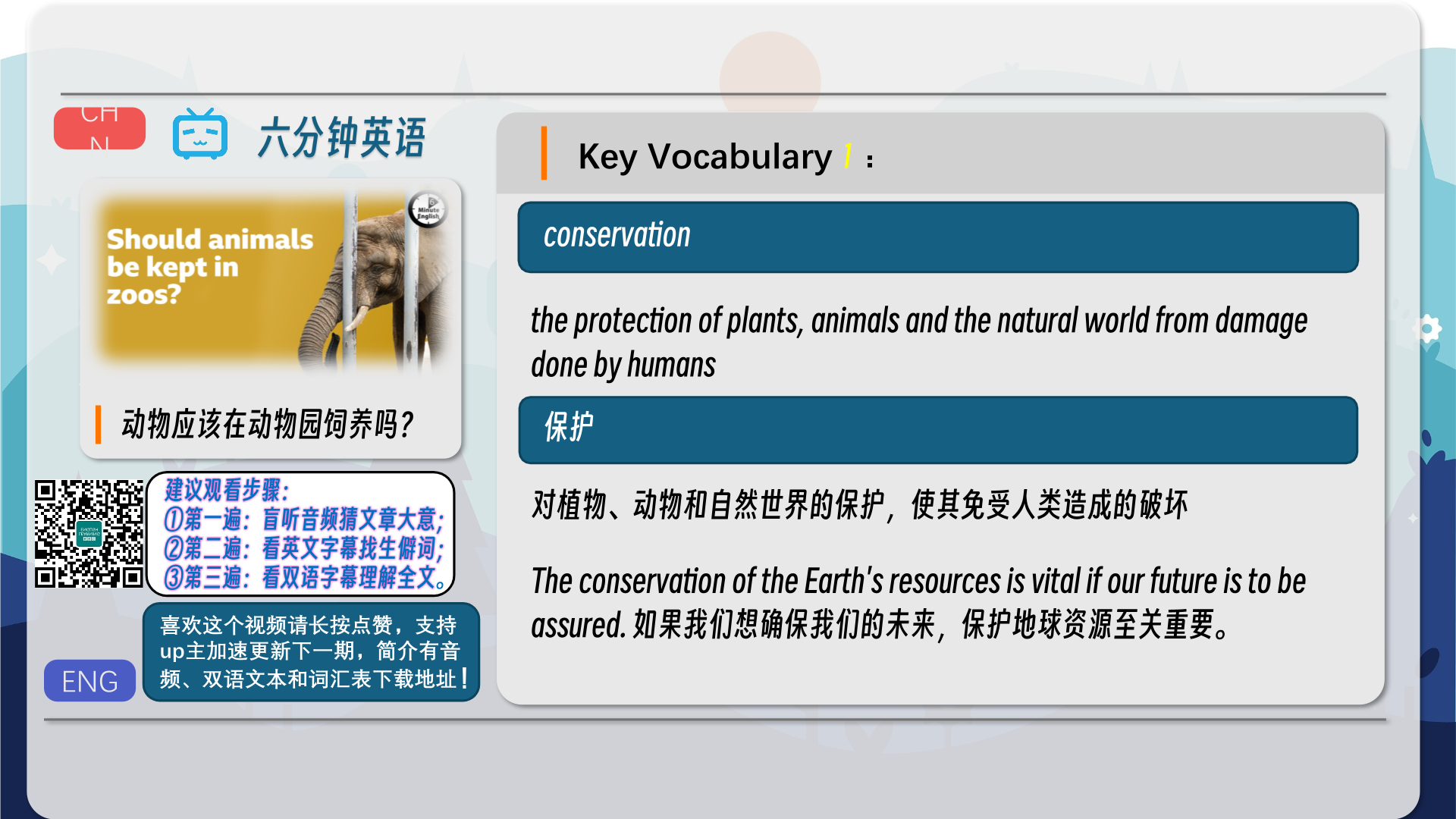
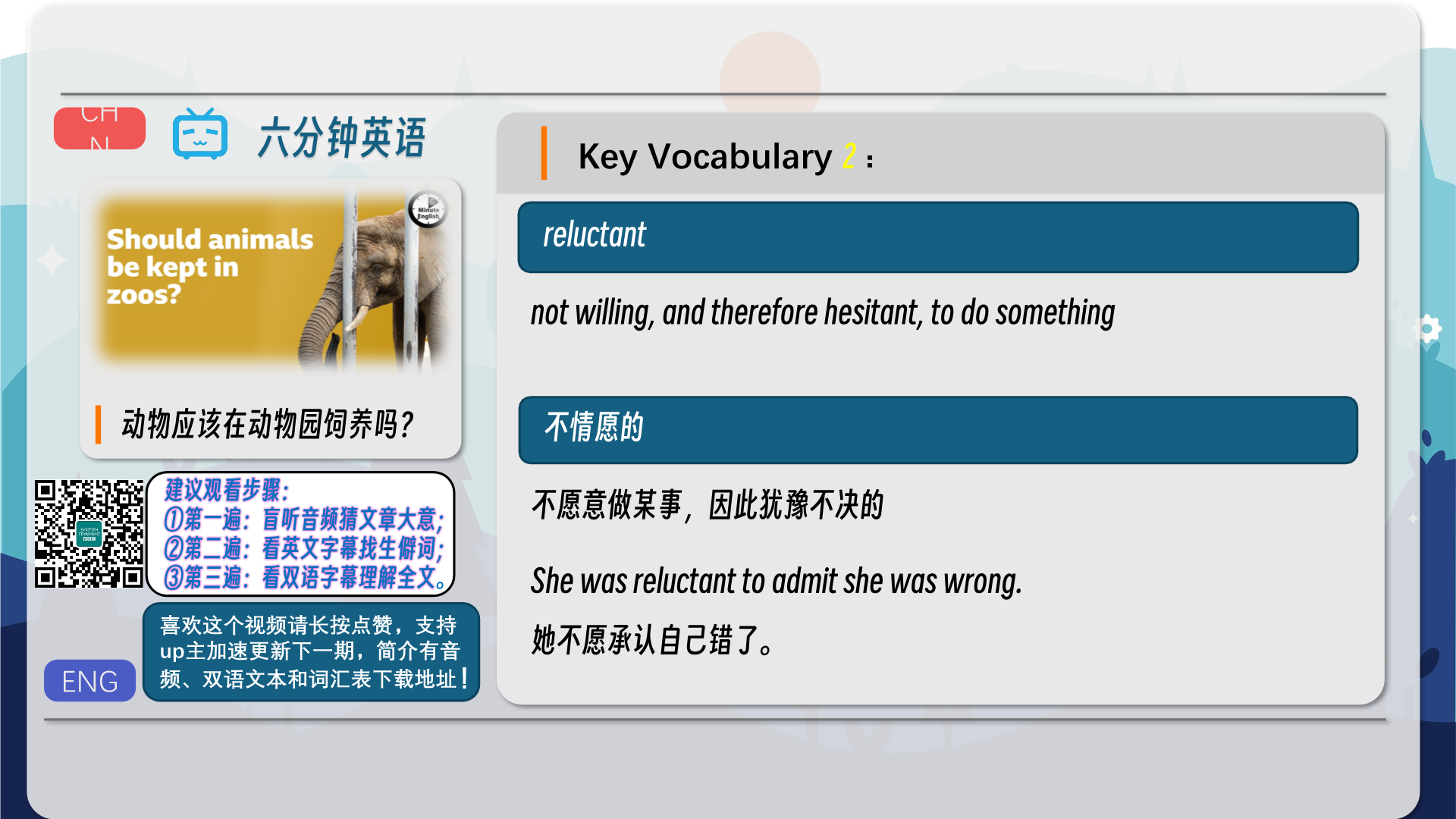
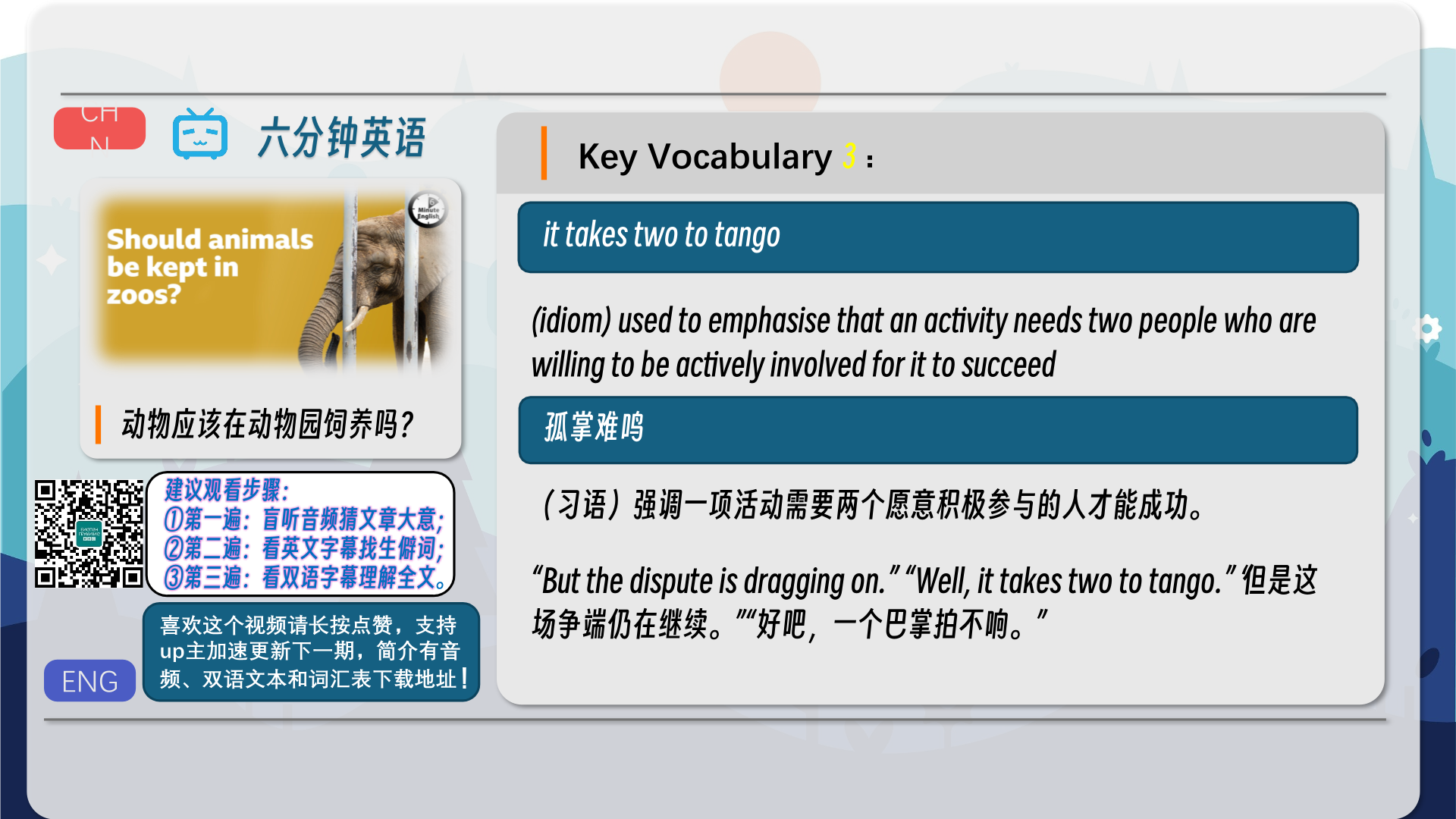
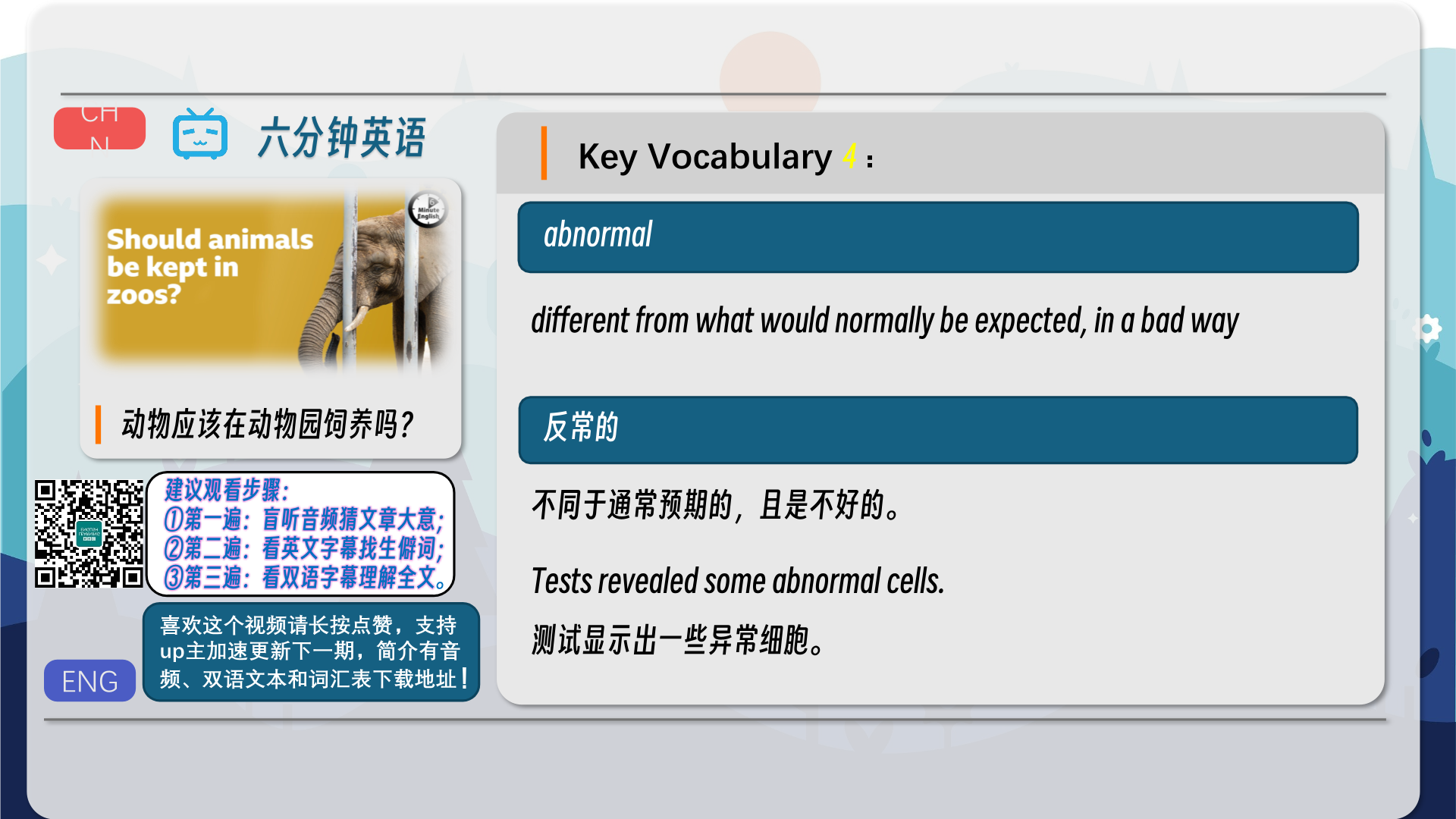
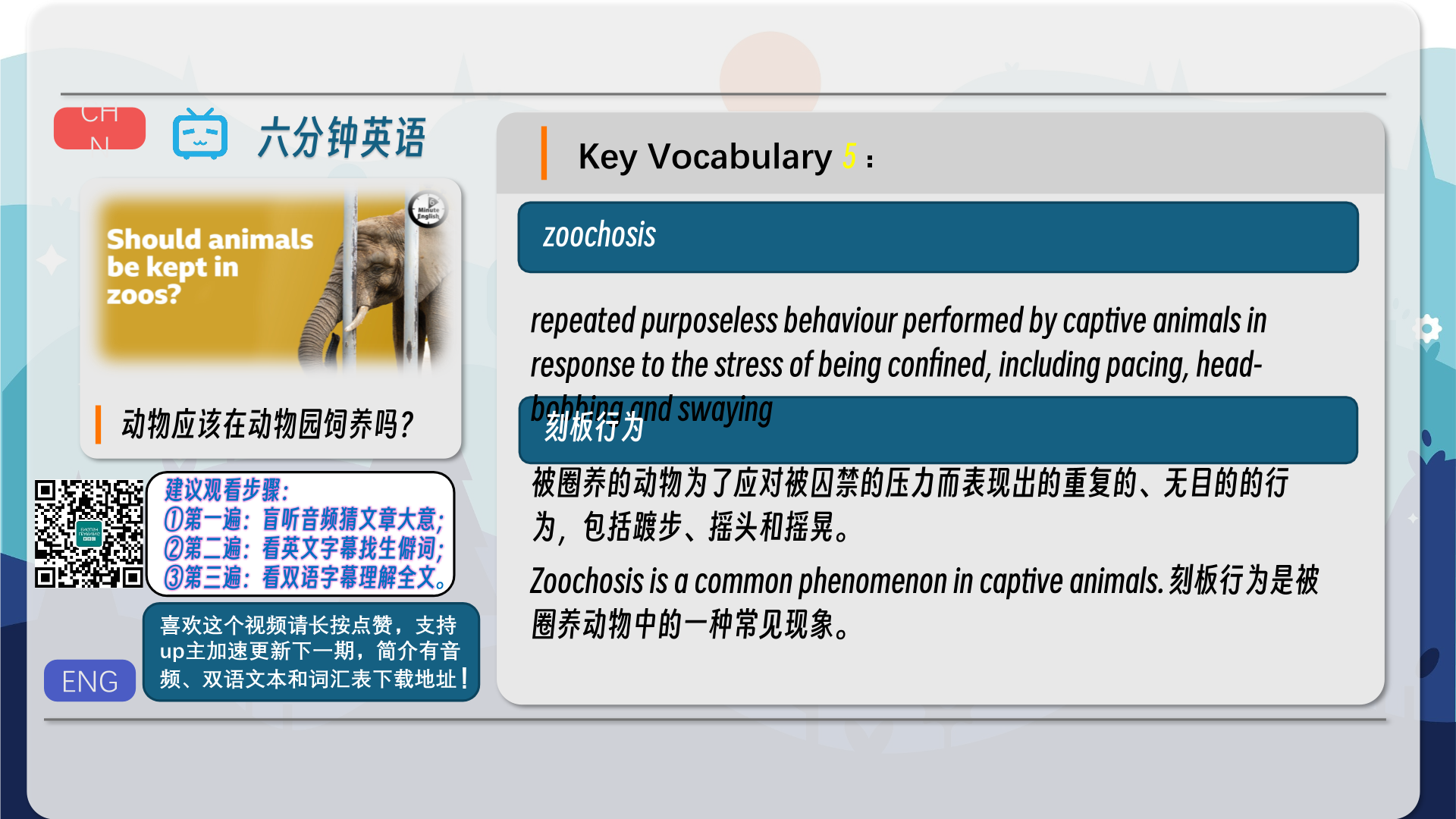
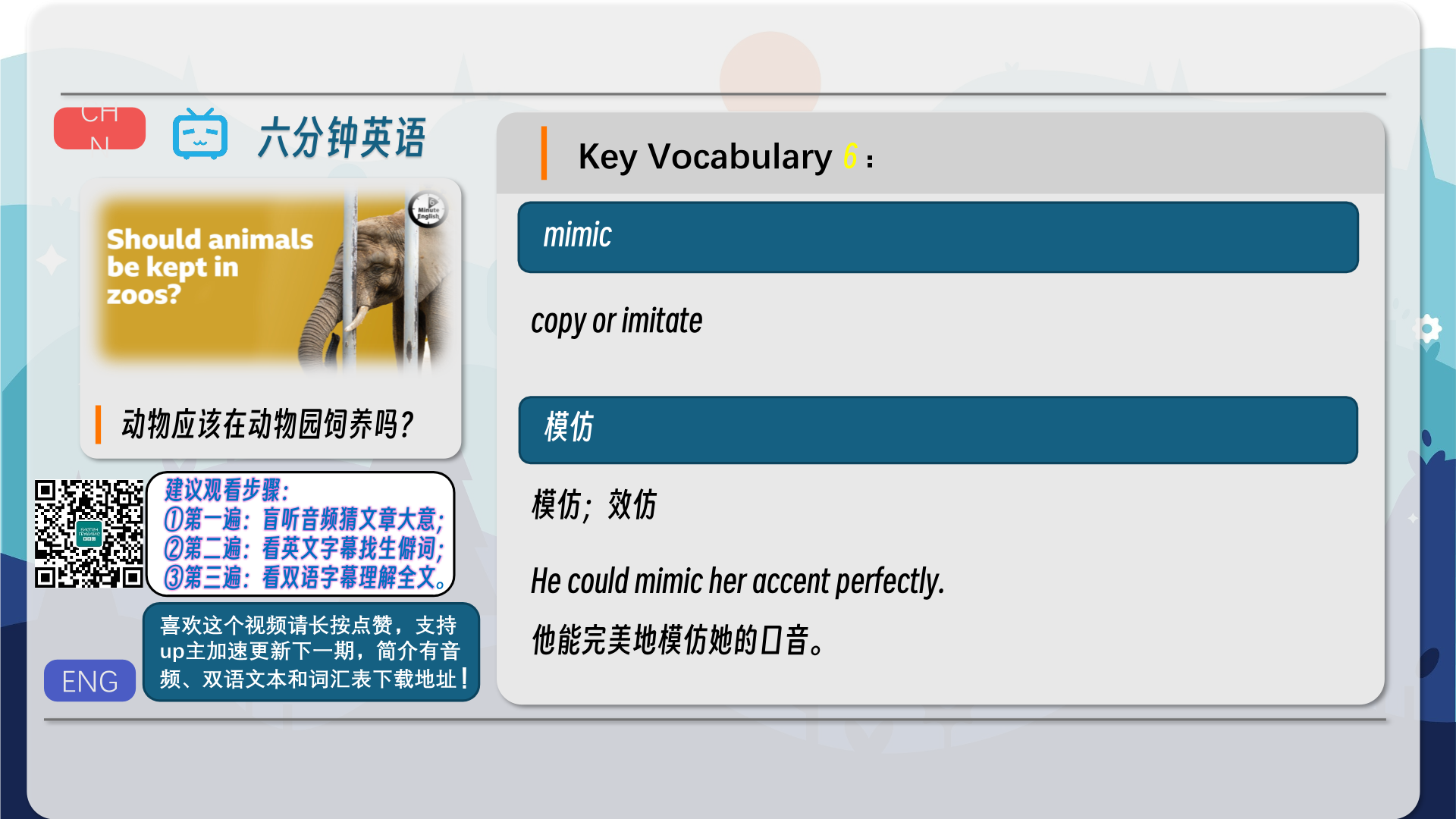
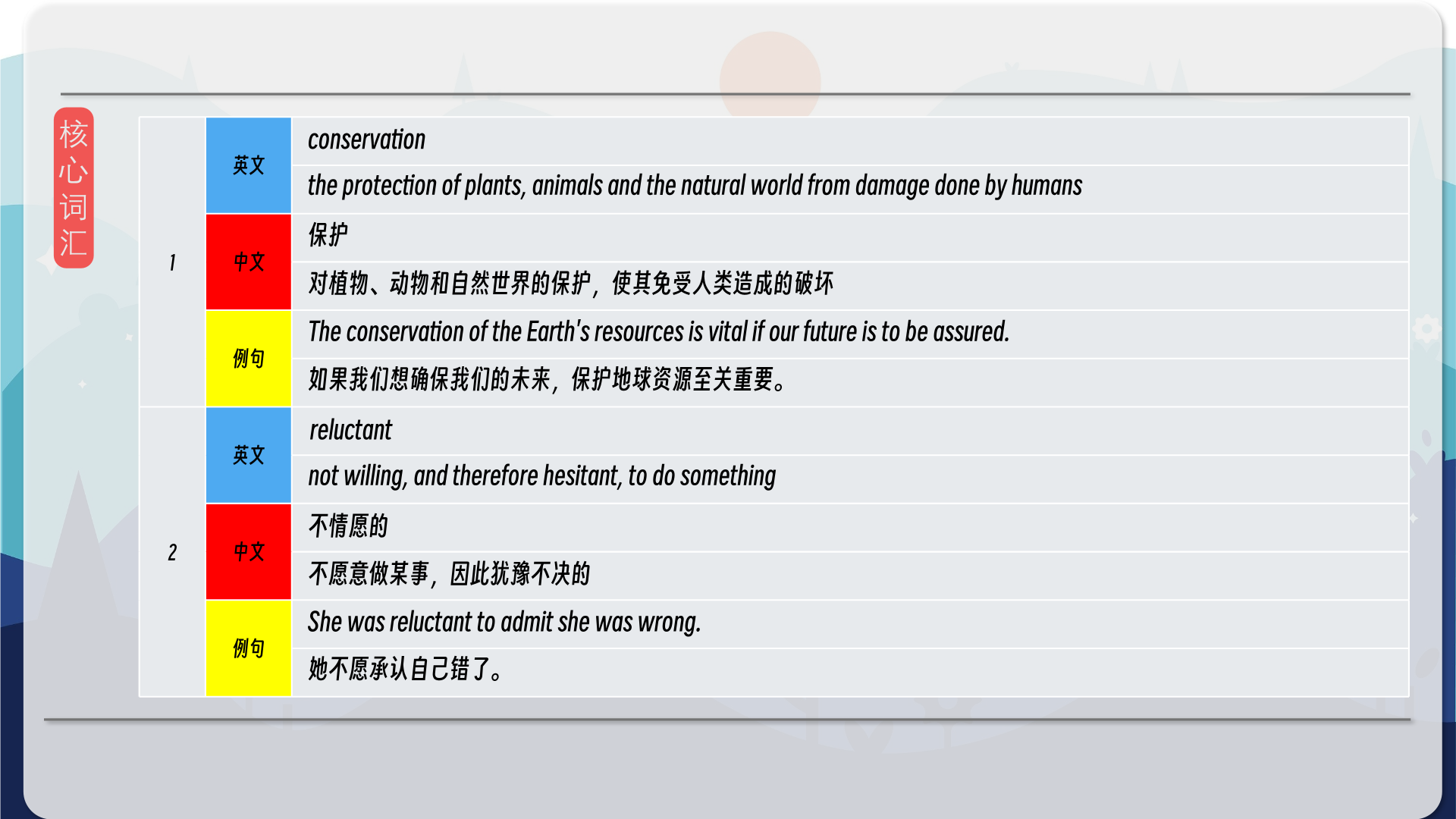
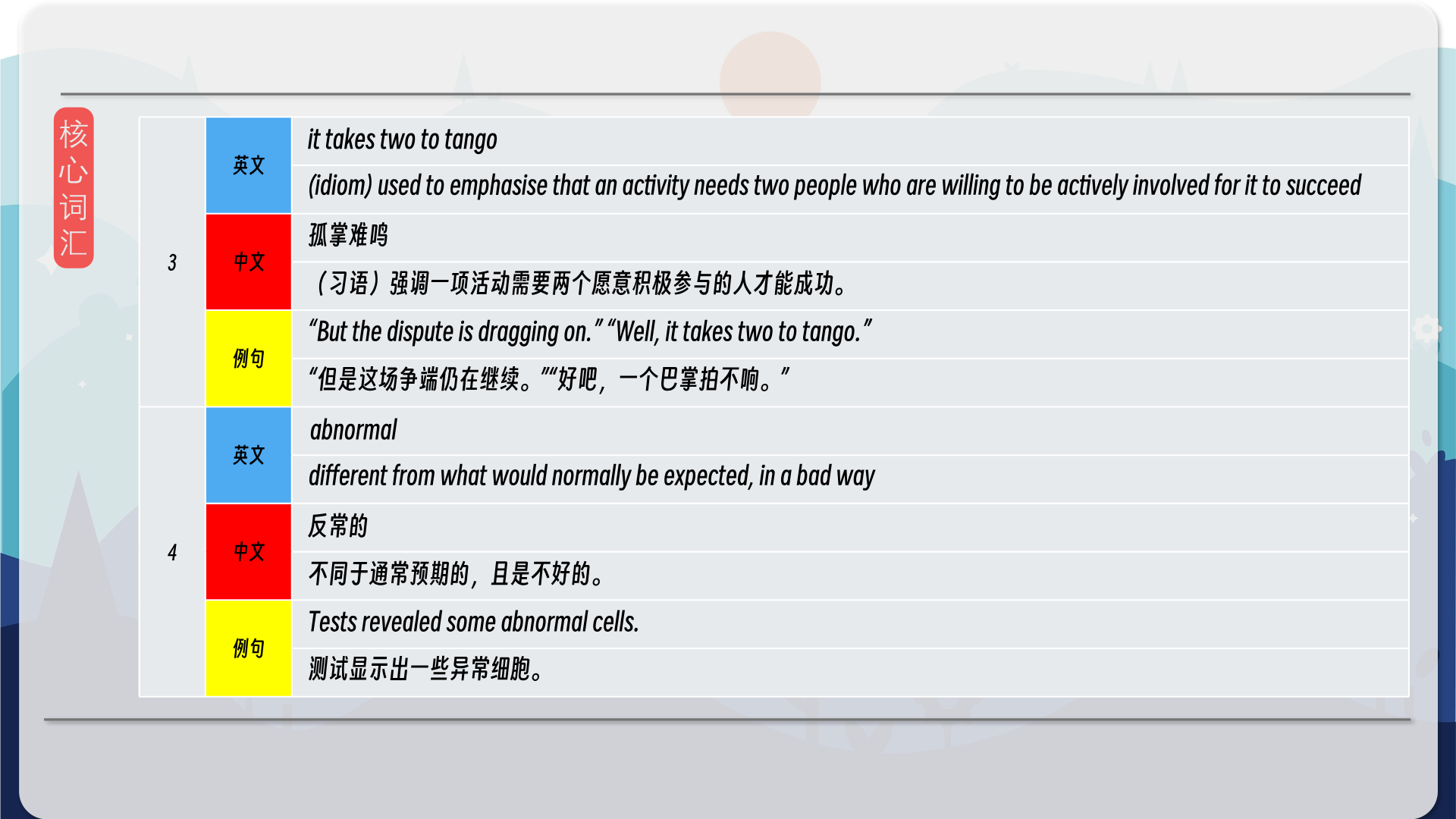
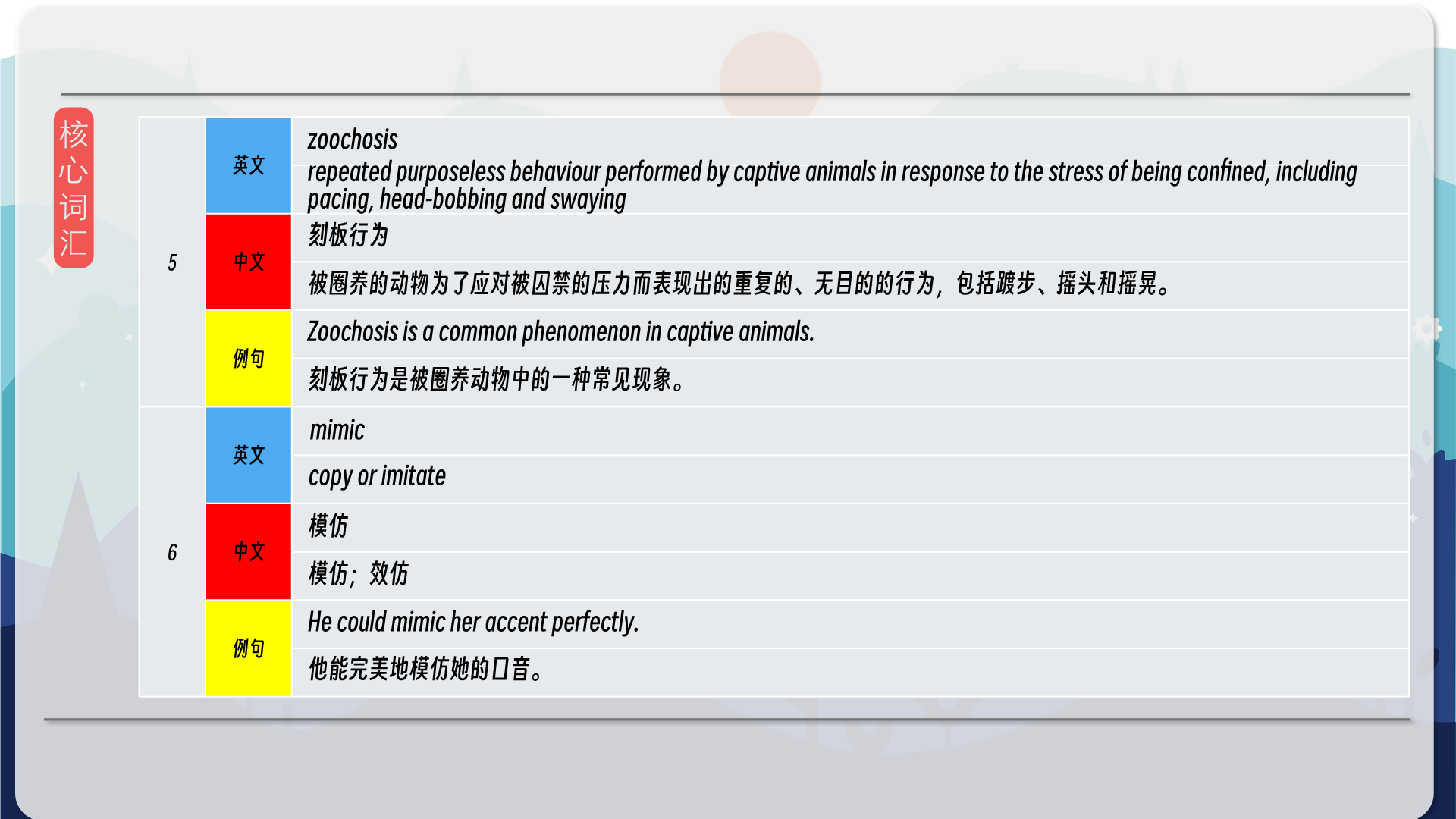






【核心词汇】
conservation
the protection of plants, animals and the natural world from damage done by humans
保护
对植物、动物和自然世界的保护,使其免受人类造成的破坏
The conservation of the Earth’s resources is vital if our future is to be assured.
如果我们想确保我们的未来,保护地球资源至关重要。
reluctant
not willing, and therefore hesitant, to do something
不情愿的
不愿意做某事,因此犹豫不决的
She was reluctant to admit she was wrong.
她不愿承认自己错了。
it takes two to tango
(idiom) used to emphasise that an activity needs two people who are willing to be actively involved for it to succeed
孤掌难鸣
(习语)强调一项活动需要两个愿意积极参与的人才能成功。
“But the dispute is dragging on.” “Well, it takes two to tango.”
“但是这场争端仍在继续。”“好吧,一个巴掌拍不响。”
abnormal
different from what would normally be expected, in a bad way
反常的
不同于通常预期的,且是不好的。
Tests revealed some abnormal cells.
测试显示出一些异常细胞。
zoochosis
repeated purposeless behaviour performed by captive animals in response to the stress of being confined, including pacing, head-bobbing and swaying
刻板行为
被圈养的动物为了应对被囚禁的压力而表现出的重复的、无目的的行为,包括踱步、摇头和摇晃。
Zoochosis is a common phenomenon in captive animals.
刻板行为是被圈养动物中的一种常见现象。
mimic
copy or imitate
模仿
模仿;效仿
He could mimic her accent perfectly.
他能完美地模仿她的口音。
在公众号里输入6位数字,获取【对话音频、英文文本、中文翻译、核心词汇和高级词汇表】电子档,6位数字【暗号】在文章的最后一张图片,如【220728】,表示22年7月28日这一期。公众号没有的文章说明还没有制作相关资料。年度合集在B站【六分钟英语】工房获取,每年共计300+文档,感谢支持!